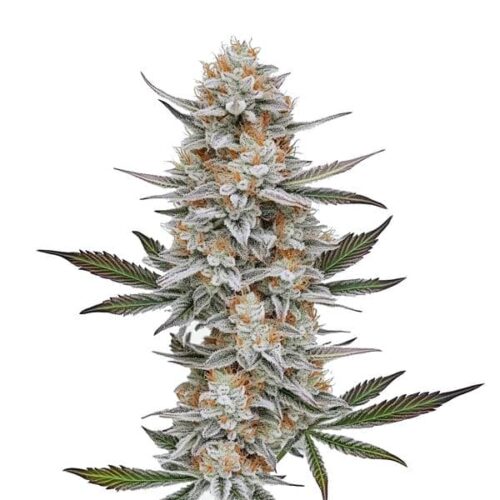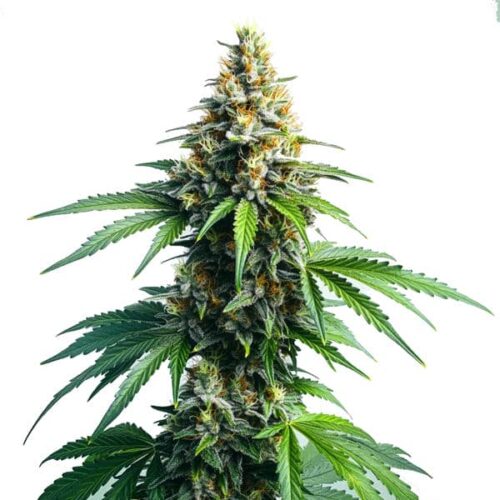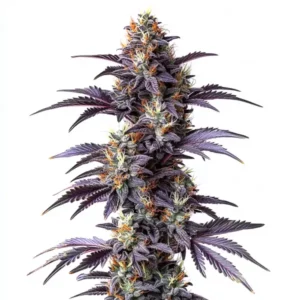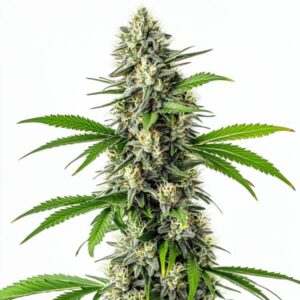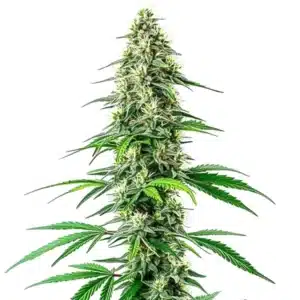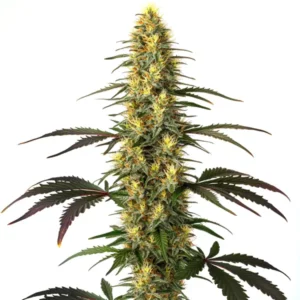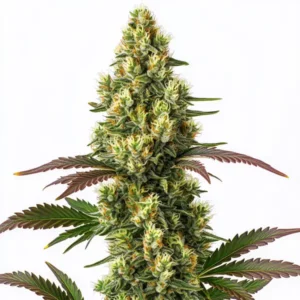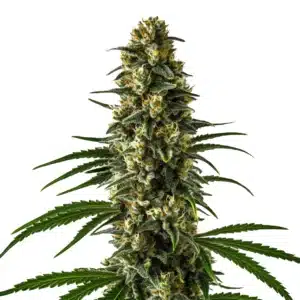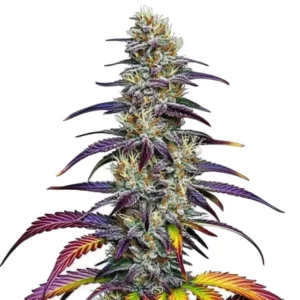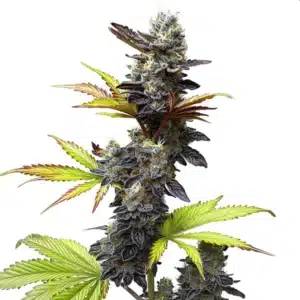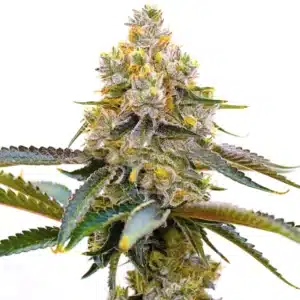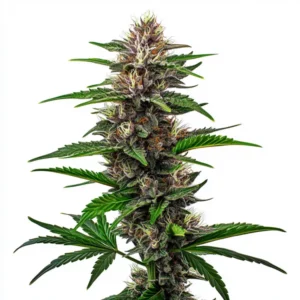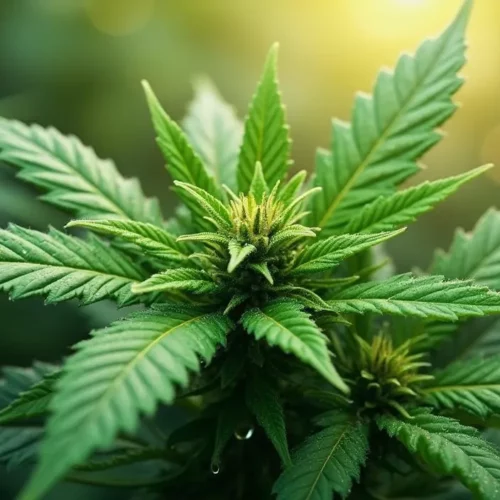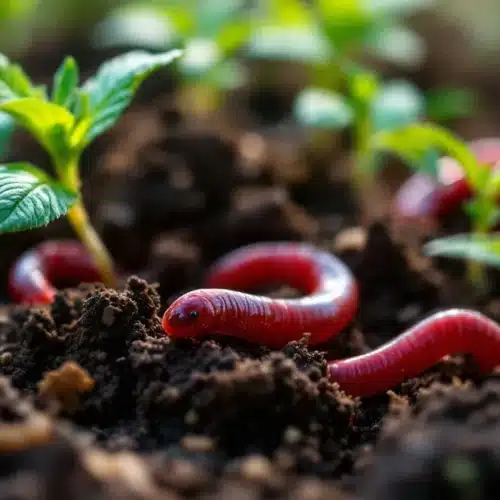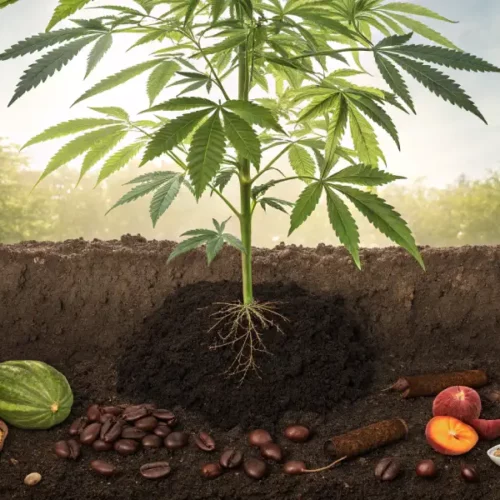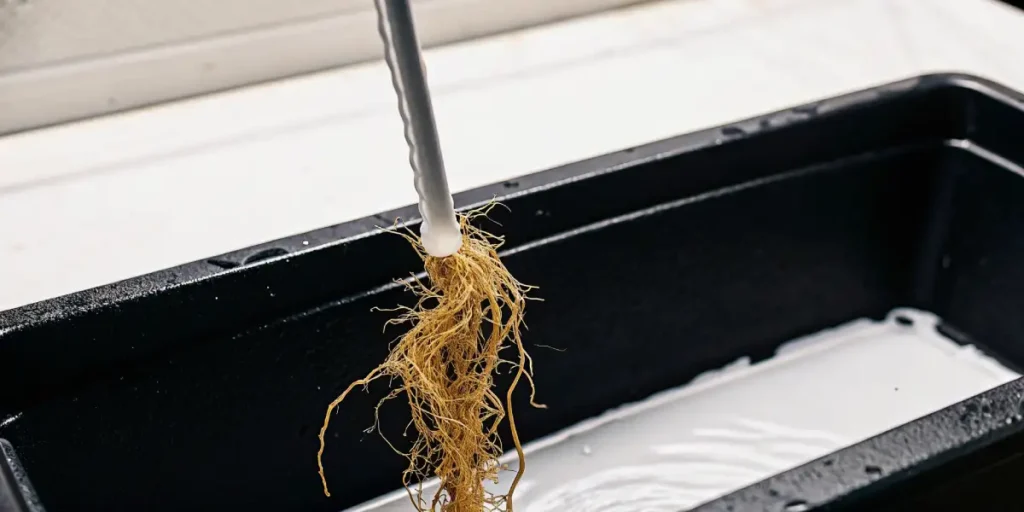
Are Cannabis Plant Roots Poisonous?
Many people focus on leaves and buds when talking about the plant. But what about the roots? A common question is, “are cannabis plant roots poisonous?” This curiosity often arises from concerns over safety and health when cultivating or experimenting with different parts of the plant.
Root toxicity effects have been a topic of research. While the roots do contain compounds different from the rest of the plant, they’re not generally considered toxic. However, it’s crucial to understand that certain compounds present might cause allergies or sensitivities in some individuals.
Recommended Strains
Chemdog #4
 THC: 18 - 26%
THC: 18 - 26% Type of seed: Feminized
Type of seed: Feminized Phenotype: Mostly Indica
Phenotype: Mostly Indica Day to flower: 7 - 9 weeks
Day to flower: 7 - 9 weeks
Afghan Kush
 THC: 16 - 21%
THC: 16 - 21% Type of seed: Feminized
Type of seed: Feminized Phenotype: Mostly Indica
Phenotype: Mostly Indica Day to flower: 6 - 8 weeks
Day to flower: 6 - 8 weeks
When evaluating the dangers of consuming cannabis roots, consider your personal health conditions and any potential allergies. For those interested in the therapeutic use of cannabis roots, it’s essential to research thoroughly and possibly consult with a health professional.
Cannabis Root Composition
The roots of the cannabis plant have a unique chemical makeup. Unlike the more famous cannabinoids found in the leaves and buds, the roots contain compounds like alkaloids, which are a group of naturally occurring compounds that mostly contain basic nitrogen atoms. These may have varying effects on humans.
Knowing the makeup of cannabis roots can help in assessing whether they are marijuana roots harmful to humans. While they don’t have the same psychoactive properties as THC, they may still interact with the body in complex ways. Some historical texts even suggest traditional uses, but modern scientific backing is sparse.
Further research into the specific alkaloids in roots might reveal more about their effects and potential benefits. Scientists are beginning to study these compounds to see if they could offer therapeutic properties without the psychoactive effects associated with other parts of the plant. As more is learned, it may help dispel concerns about whether roots are poisonous.
It’s also worth noting that roots may contain trace minerals absorbed from the soil, which can contribute to their overall composition. This factor makes it even more critical to ensure that plants are grown in clean, uncontaminated environments to minimize any potential risks of root ingestion.
Cannabis Root Uses in History
Historically, cannabis roots have been used in various traditional remedies. Ancient cultures sometimes used them in teas or poultices. These practices suggest that roots were not considered dangerous or poisonous in traditional medicine.
However, it’s vital to approach these historical uses cautiously. Just because something was used in the past doesn’t guarantee its safety or efficacy today. Modern users should be wary of potential risks of cannabis root ingestion, particularly since individual reactions can vary widely.
Traditional preparations often involved boiling or steeping the roots, which could alter their chemical structure and potentially reduce any adverse effects. This historical context is important when considering the question, “are cannabis plant roots poisonous?” It suggests that while not inherently toxic, they should still be treated with respect and caution.
Research into traditional uses may inspire modern applications, but it’s crucial to adapt these methods with current scientific knowledge and safety standards. As curiosity about cannabis roots grows, more studies are needed to validate historical claims and ensure safe use in today’s context.
Promos & Deals
Potential Benefits of Cannabis Roots
Despite concerns, some users report benefits from using cannabis roots. These may include anti-inflammatory properties and pain relief. It’s believed that certain compounds in the roots contribute to these effects.
When considering the safety of cannabis root extracts, it’s essential to source them responsibly. Products from reputable suppliers such as those found at Blimburn Seeds ensure quality and reduce risks associated with contamination or improper processing.
Along with anti-inflammatory properties, cannabis roots might offer antioxidant benefits. These properties could play a role in reducing oxidative stress in the body, which is linked to various chronic conditions. However, more scientific validation is needed to confirm these potential benefits.
As interest in natural remedies grows, the exploration of cannabis roots’ therapeutic potential continues. While there are anecdotal reports of benefits, it’s essential to balance enthusiasm with caution, ensuring that claims are supported by solid research to prevent misconceptions about the dangers of consuming cannabis roots.
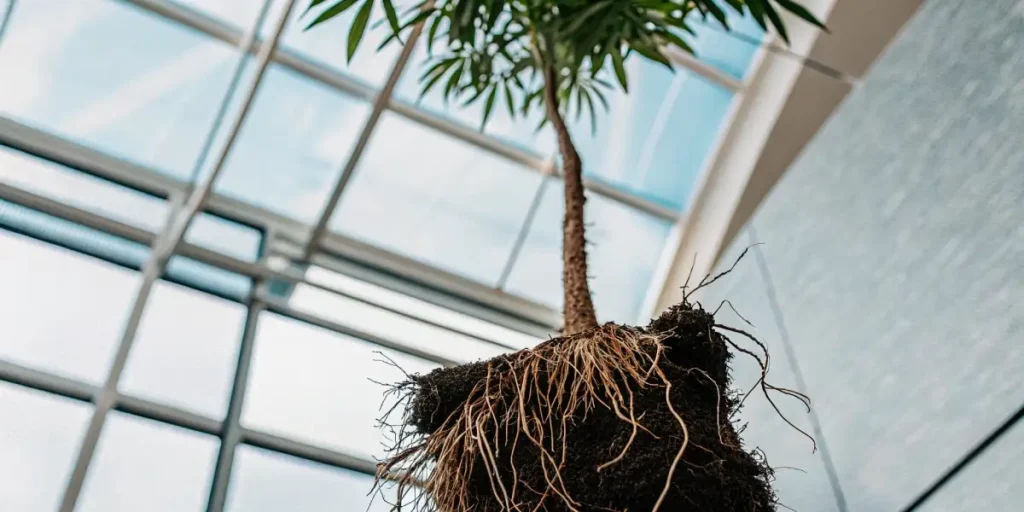
Modern Uses and Preparations
In modern contexts, cannabis roots can be prepared in various ways. Some choose to make teas or infusions. Others might grind them into powders for topical applications. These methods aim to harness any potential therapeutic benefits while minimizing risks.
Different strains might offer varied root benefits. For example, strains like Original Lemon Pie, Blue Dream, and Girl Scout Cookies from Blimburn Seeds could have different levels of beneficial compounds in their roots.
The preparation method can significantly influence the safety of cannabis root extracts. For instance, making a tea might extract different compounds compared to creating a topical ointment. Recognizing these differences is key to achieving the desired effects while minimizing any adverse reactions.
Moreover, some enthusiasts are experimenting with fermenting cannabis roots to create unique products. This approach might alter the root’s chemical composition, potentially uncovering new benefits or risks. As such, it’s crucial to proceed with care and ensure that any new methods are thoroughly researched and tested.
Risks and Considerations
While there are potential benefits, it’s crucial to acknowledge the potential risks of cannabis root ingestion. Not everyone will react the same way, and some might experience adverse effects.
It’s also essential to consider legal aspects. In some regions, using parts of the cannabis plant, including roots, might be regulated. Always check local laws and regulations before experimenting with any parts of the plant.
One of the primary concerns is the potential for contamination. Cannabis roots can absorb toxins from the soil, which might pose health risks if ingested. This highlights the importance of sourcing cannabis from reputable growers who adhere to strict cultivation standards.
Additionally, the question “are marijuana roots harmful to humans” can’t be answered universally. Individual health conditions, allergies, and sensitivities play a significant role in determining the safety of cannabis root usage. Consulting with healthcare professionals before trying new substances is always recommended.
Handling and Storage Tips
If you decide to use cannabis roots, proper handling and storage are key. Store them in a cool, dry place to prevent mold and degradation. This ensures their longevity and safety.
When handling cannabis roots, use clean tools and equipment. This reduces the risk of contamination, which could introduce harmful bacteria or fungi to your preparations.
To further ensure the safety of cannabis root extracts, consider drying the roots thoroughly before storage. Moisture can lead to mold growth, which is a significant health hazard. Proper drying techniques can preserve the roots’ integrity and potential benefits.
Additionally, labeling stored roots with the strain and date of harvest can help track their age and potency. Freshness can impact the effectiveness and safety of the roots, so keeping organized records is beneficial for anyone regularly using cannabis roots.
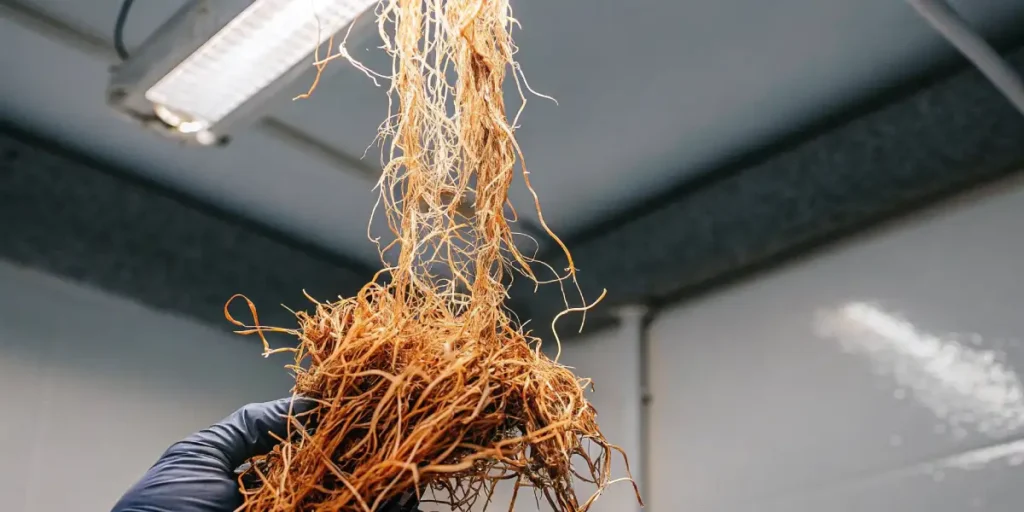
FAQs of Are Cannabis Plant Roots Poisonous
Are cannabis plant roots poisonous if ingested?
Roots are not classified as poisonous. However, they do contain different compounds than the leaves or buds. While generally considered safe, individual reactions vary, and some may experience allergies or sensitivities.
If you’re considering ingesting roots, it’s wise to start with small amounts. Consult with a healthcare professional if you have any underlying health conditions that might be affected.
It’s worth noting that while roots aren’t considered inherently toxic, their safety largely depends on how they are prepared and consumed. Knowing the preparation methods can help mitigate any potential risks associated with their use.
Ultimately, while the question “are cannabis plant roots poisonous” can mostly be answered with a “no,” individual factors will always play a role. Personal health histories and current medical conditions should be considered when experimenting with any new substance.
What are the cannabis plant root toxicity effects?
The toxicity effects of cannabis plant roots are not well-documented. Most studies focus on the aerial parts of the plant. However, some compounds in the roots could cause allergic reactions or sensitivities in some people.
In general, the roots are not known to produce psychoactive effects like THC does. Always approach any new substance with caution to avoid unexpected reactions.
Further research into root toxicity effects could help clarify their safety profile. As scientists investigate these compounds, they may identify specific reactions or interactions that could inform safer consumption practices.
Educating oneself about potential allergic reactions and monitoring one’s health after ingesting cannabis roots can provide valuable insights. Any unexpected symptoms should be taken seriously to prevent more severe health issues.
Are marijuana roots harmful to humans in any way?
Marijuana roots are not inherently harmful to humans. However, they can contain compounds that may not be suitable for everyone. Some individuals may experience mild adverse effects, especially if they have allergies.
It’s always best to experiment with caution and be mindful of any changes in your body’s response. If you notice any adverse effects, discontinue use immediately and consult a healthcare provider.
Aside from allergies, the potential for soil contamination raises questions about the safety of consuming cannabis roots. Ensuring that the plant is grown in clean conditions can help mitigate these concerns and reduce the risks of adverse reactions.
By knowing the factors that can make marijuana roots harmful, consumers can make informed decisions that prioritize their health. Careful consideration of dosage and preparation methods can further enhance safety when using cannabis roots.
Are cannabis plant roots poisonous? Know the dangers of consuming cannabis roots
Consuming cannabis roots typically poses minimal danger when done responsibly. However, improper preparation or contamination with pesticides can introduce risks. Always ensure your roots are clean and sourced from reputable suppliers.
Additionally, some legal issues may arise depending on your location. It’s crucial to understand local regulations regarding the use and possession of cannabis and its parts.
One of the primary dangers of consuming cannabis roots is the potential for unexpected interactions with other medications or health conditions. Consulting with a healthcare professional before trying cannabis roots can help prevent these issues.
The question “are cannabis plant roots poisonous” is often asked by those concerned about safety. While generally non-toxic, ensuring proper preparation and sourcing is vital to avoid any potential dangers associated with their use.
Is there a safety concern with cannabis root extracts?
Cannabis root extracts are generally considered safe when produced and used correctly. The key is ensuring they are free from contaminants and sourced responsibly. Quality checks are essential to minimize safety concerns.
Reputable suppliers, like those listed on Blimburn Seeds, provide quality-assured products. Always follow recommended dosages and consult with professionals if you have any concerns.
Besides sourcing, the method of extraction can influence the safety of cannabis root extracts. Different extraction processes might yield varying concentrations of active compounds, which can affect their efficacy and safety profile.
For those exploring cannabis root extracts, it’s essential to stay informed about the latest research and best practices. This knowledge can help ensure a safe and beneficial experience while minimizing potential risks of cannabis root ingestion.


